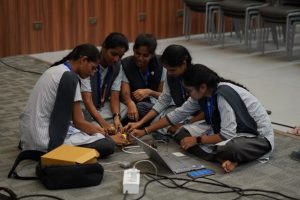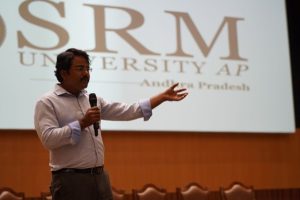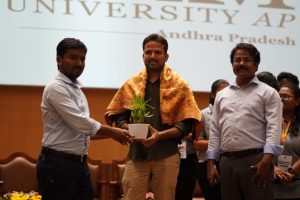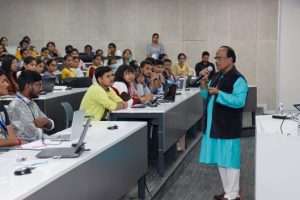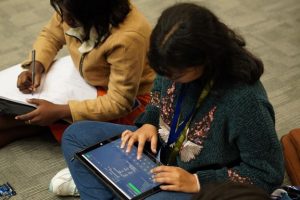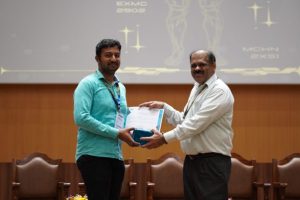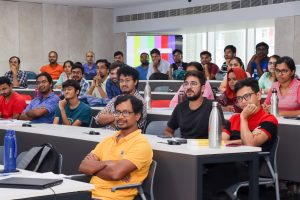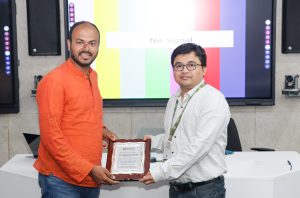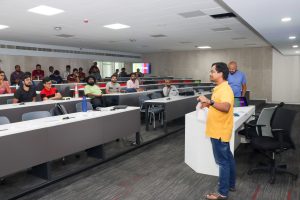Robotrix: A Stepping Stone in the Field of Robotics
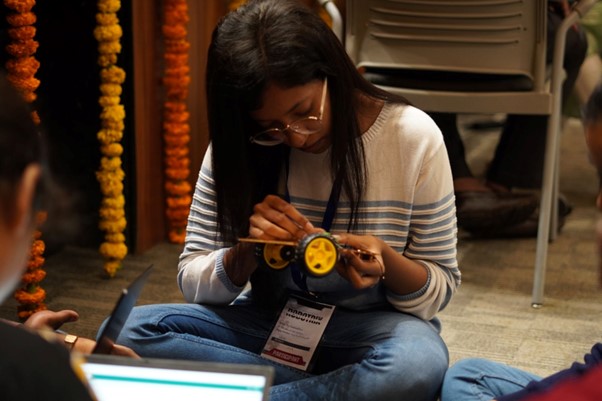
IndustreeOwl and Home of Leaders, Directorate of Entrepreneurship and Innovation conducted a 2-day experiential Hands-on workshop on Robotics named ROBOTRIX on September 05 and 06, 2023, in collaboration with OSSEB, a Hyderabad-based company focused on providing students with relevant skillset according to industry demands. The workshop witnessed the presence of Mr Mohammad Abdul Khayyum, Chief Executive Officer of OSSEB, and Mr Ashish Kumar, who assumed the role of mentor for the two-day event. The guest mentors attended the workshop on behalf of OSSEB, signifying their active engagement and commitment to the workshop’s primary objective to provide students with essential knowledge as a crucial stepping stone for their future endeavours.
The workshop was conducted on the topic “Hands-on Experience on Android Controlled Robotics and Bluetooth Communications”. Students were encouraged to develop their own robots that could be controlled via their Android Phone’s Bluetooth. 139 students registered for the workshop out of which 122 people attended the 2-Day hands-on workshop with many participants registering on-spot. The students were eager to participate and learn about Robotics. Out of 122, almost 50 per cent of the participants were from the NRI Institute of Technology, Vijayawada.
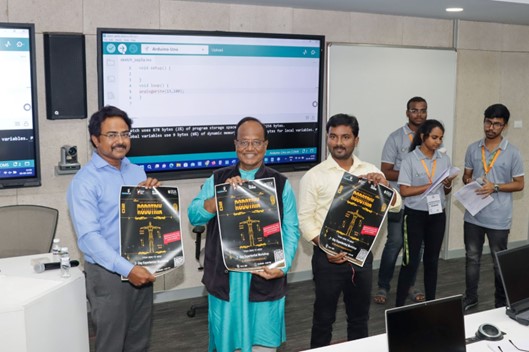
The Workshop also included sessions on the basics of electronics and robotics where students were made to understand the concepts like Flow of Current in a battery, Motors, etc. along with the laws of Robotics and their applications. Insight into how, in the near future Robotics will ally with Artificial Intelligence to give a new shape to the world, was also discussed. This was followed by a session on hands-on activities where participants were formally instructed in the intricacies of programming the robot to facilitate its operational functionality and how to connect to the Robot with the help of the kit provided by OSSEB with their Code.
An Eminent Guest lecture featuring Shri J A Chowdhury, former ISRO scientist, Technological Leader and innovator who has been contributing to the development of the Indian IT industry for more than 35 years was conducted on the grand occasion of Teacher’s Day. He shared his professional experience including his understanding of Robotics and how it will be pivotal in shaping the future. Shri J A Chowdhury along with Mr Udayan Bakshi, Associate Director and Mr Sundhar Singh, Manager-Outreach, Directorate of Entrepreneurship & Innovation inaugurated the Robotrix poster symbolising this momentous Workshop.
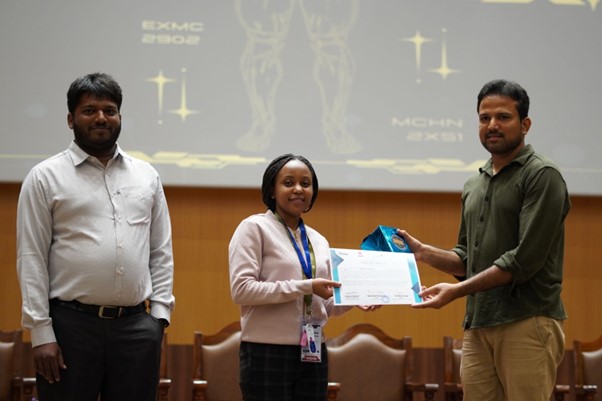
A Presentation Competition was spontaneously conducted by the IndustreeOwl team aimed at actively involving the students and fostering their practical application of the newly acquired knowledge. Pallavi Madala and Fadzai Ethel Muchina from SRM University-AP secured the first and second prize respectively.
The second day saw a continuation of hands-on training where participants were taught to develop the code for controlling the movement of the Robot. They were also taught about Bluetooth Communications and were urged to install an application in their phone which will be pivotal in controlling the Robot. The session was followed by a Quiz Competition that saw the participation of more than 100 students. Yaswanth Dhulipalla from SRM University-AP bagged the first prize, whereas Saikeerthi Aluri and Punuru Varsha Reddy from SRM University-AP won the second and third prizes respectively.
The event successfully concluded with a speech and vote of thanks by Mr Udayan Bakshi where he urged the students to continue moving forward in their Robotics journey with the help of the kits and the mentors from OSSEB. He also felicitated the guests and mentors from OSSEB and the team of IndustreeOwl for the smooth conduction of the Workshop.
The workshop has not only met but exceeded its objective of imparting students with a foundational understanding of Robots and Robot Design. This newly acquired knowledge will undoubtedly serve as a solid stepping stone for them in their future endeavours, equipping them with valuable skills and insights that will open up exciting opportunities and possibilities in the world of robotics and design.
- Published in Departmental News, IDEA NEWS, IDEA Workshop, News, Workshop
SRM University-AP hosted AIS School on p-adic methods in Arithmetic
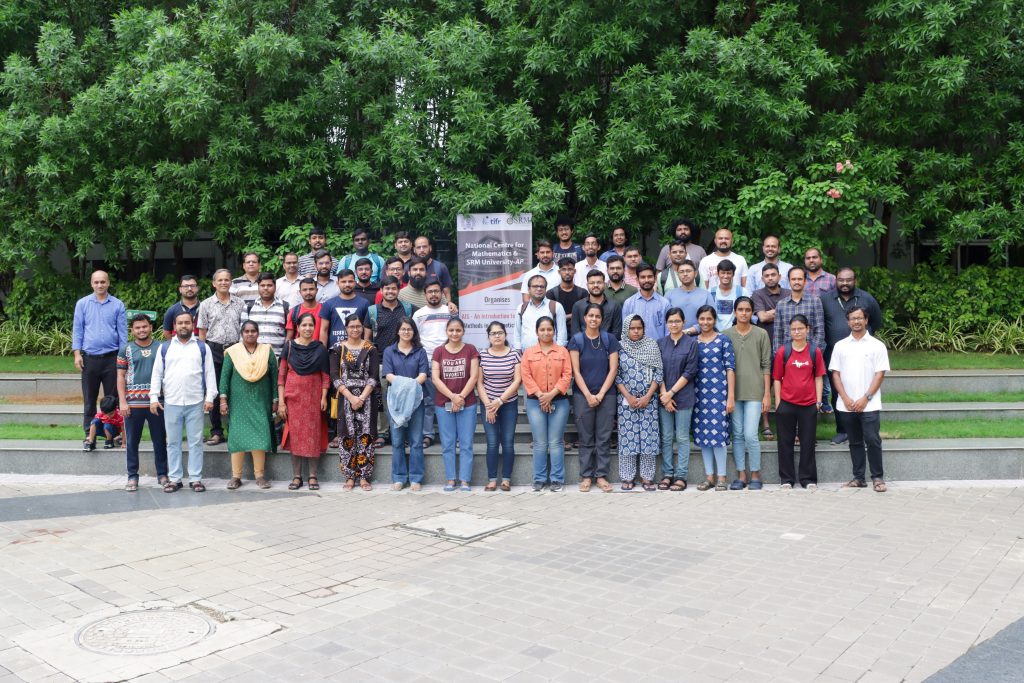
The Department of Mathematics, in collaboration with the National Centre for Mathematics, organised an AIS school on p-adic methods in Arithmetic from June 26 to July 15, 2023 at the campus. Over 58 students, research scholars, post-doc fellows and faculty from reputed universities such as IIT Hyderabad, IIT Guwahati, IISER, University of Hyderabad, Pondicherry University, Banaras Hindu University etc. participated in the three-week-long AIS school, which was conducted with the prime objective to study the p-adic numbers and the p-adic methods in arithmetic.
Prof. C S Rajan, Ashoka University; Dr Manish Kumar Pandey and Dr Sazzad Ali Biswas, SRM University-AP; Dr Amiya Kumar Mondal, IISER Berhampur; Dr Santosh Nadimpalli, IIT Kanpur; Dr Shaunak Deo, IISc, Bangalore; and Dr Mihir Sheth, Post-Doc, IISc, Bangalore were the speakers at the school. The sessions were delivered in collaboration with course associates /tutors. Dr Arindam Jana, Postdoc, TIFR Mumbai; Dr Ravitheja Vangola, Postdoc, IISC Bangalore; Mr Sagar Shrivastava, Mr Manodeep Raha, and Mr Niladri Sekhar Patra, PhD scholar, TIFR Mumbai were the tutors mentoring the participants.
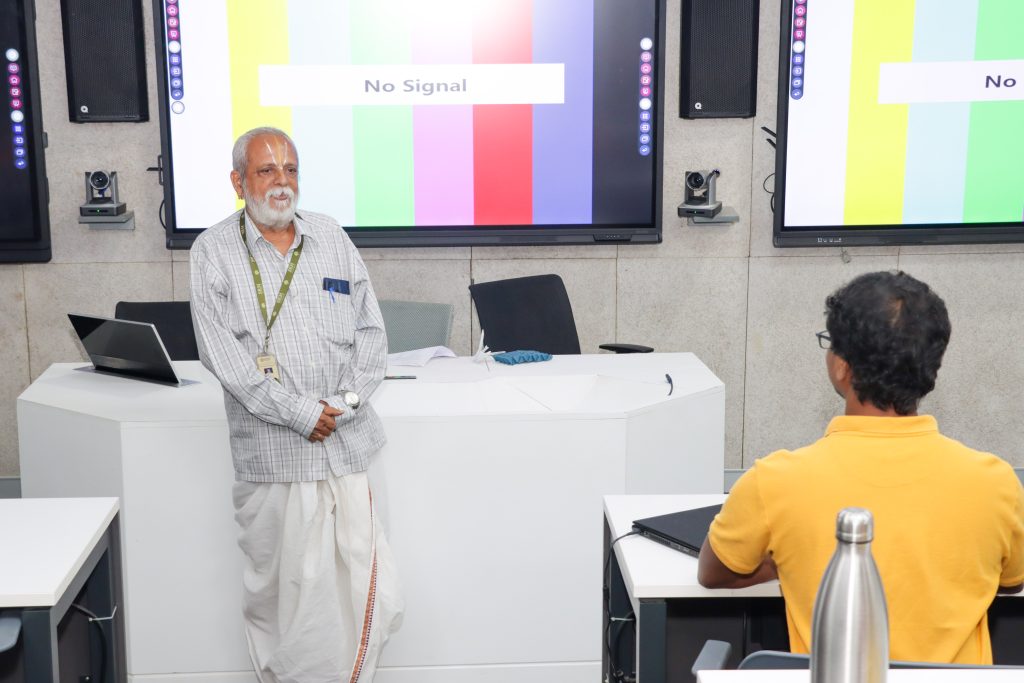
Prof. C S Rajan delivered 9 lectures – four lectures in the first week of the programme and five lectures at the end of the programme. The first part of his session covered topics such as Hensel’s Lemma and Local-Global Principle while the latter part focused on the Main Conjecture of Iwasawa Theory and Introduction to the work of Ribet (Converse to Herbrand) and subsequent work.
Dr Sazzad Ali Biswas offered his insights on topics like Construction of p-adic numbers, Various Properties (algebraic and Analytic) of p-adic numbers, Arithmetic operations of p-adic numbers and Local-Global Principle in five sessions. Dr Manish Kumar Pandey gave two lectures on the Special values of the Riemann zeta functions.
Local Fields, Global Fields and p-adic algebraic numbers were the focal points of the four lectures delivered by Dr Mihir Sheth. Dr Amiya Kumar Mondal took five lectures on Modular Forms and Dr Santosh Nadimpally gave five lectures on the Construction of p-adic zeta functions and the Various properties of p-adic Zeta function. Dr Shaunak Deo dealt with topics including Cyclotomic Fields, Iwasawa’s Construction of p-adic L-fucntions and p-adic Family of Modular Forms through six lectures.
The AIS School was organised by Prof. C S Rajan of Ashoka University and Assistant Professors Dr Manish Kumar Pandey and Dr Sazzad Ali Biswas of the Department of Mathematics at SRM University-AP. The programme successfully concluded with the active participation of students, scholars and faculty who assembled to exchange constructive discourse on p-adic methods in Arithmartics.
- Published in Departmental News, Math News, News
Research on Tribal Communities Receives Green Flag from ICSSR
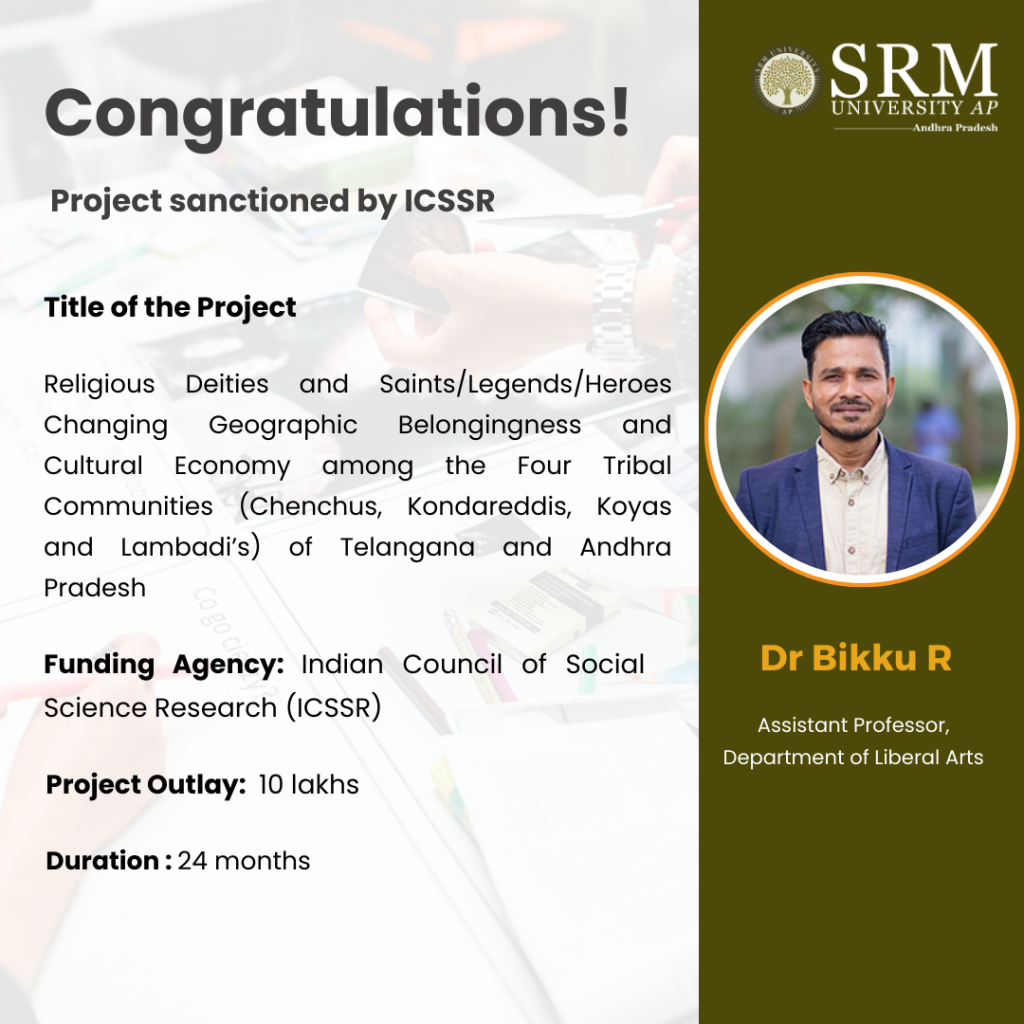
SRM University-AP proudly announces that Dr Bikku R, Assistant Professor at The Department of Liberal Arts has been sanctioned a major research project by the Indian Council of Social Science Research (ICSSR). The research project titled “Religious Deities and Saints/Legends/Heroes Changing Geographic Belongingness and Cultural Economy among the Four Tribal Communities (Chenchus, Kondareddis, Koyas and Lambadi’s) of Telangana and Andhra Pradesh” will receive an outlay of Rs. 10.00 Lakhs.
Congratulations, Dr Bikku on this outstanding achievement!
Research Abstract
India is one of the most diverse countries in the world, where around 705 scheduled tribes are notified with their distinct culture, and as per the 2011 census, they constitute 8.6% of the total population. Out of these, 75 communities belong to Particular Vulnerable Tribal Groups (PVTGs), having declining or stagnant populations, low literacy rates, pre-agricultural technologies and economic backwardness. For tribal communities, culture, economic, political and geographical belongingness are distinct from non-tribals in India. Studying their religious beliefs and practices and changing cultural economies and landscapes is crucial to preserving India’s diverse cultures. The existing studies by social scientists have not emphasised much on tribal saints/ heroes, changing cultural economies and landscapes in India, particularly in the newly bifurcated southern states, Telangana and Andhra Pradesh. The study focuses on religious deities and Saints/Legends/Heroes, changing geographic belongingness and cultural economies among the four tribal communities (Chenchus, Kondareddis, Koyas and Lambadis) of Telangana and AP states of India. Qualitative (ethnographic) and quantitative methods will be used to map their deities and saints/legends/heroes, cultural economy and traditions and record memories of past and contemporary relationships with the belonging to their landscapes and natural resources.
- Published in Departmental News, Liberal Arts News, News, Research News
Teacher-Student Duo Author a Chapter on Graph Neural Networks
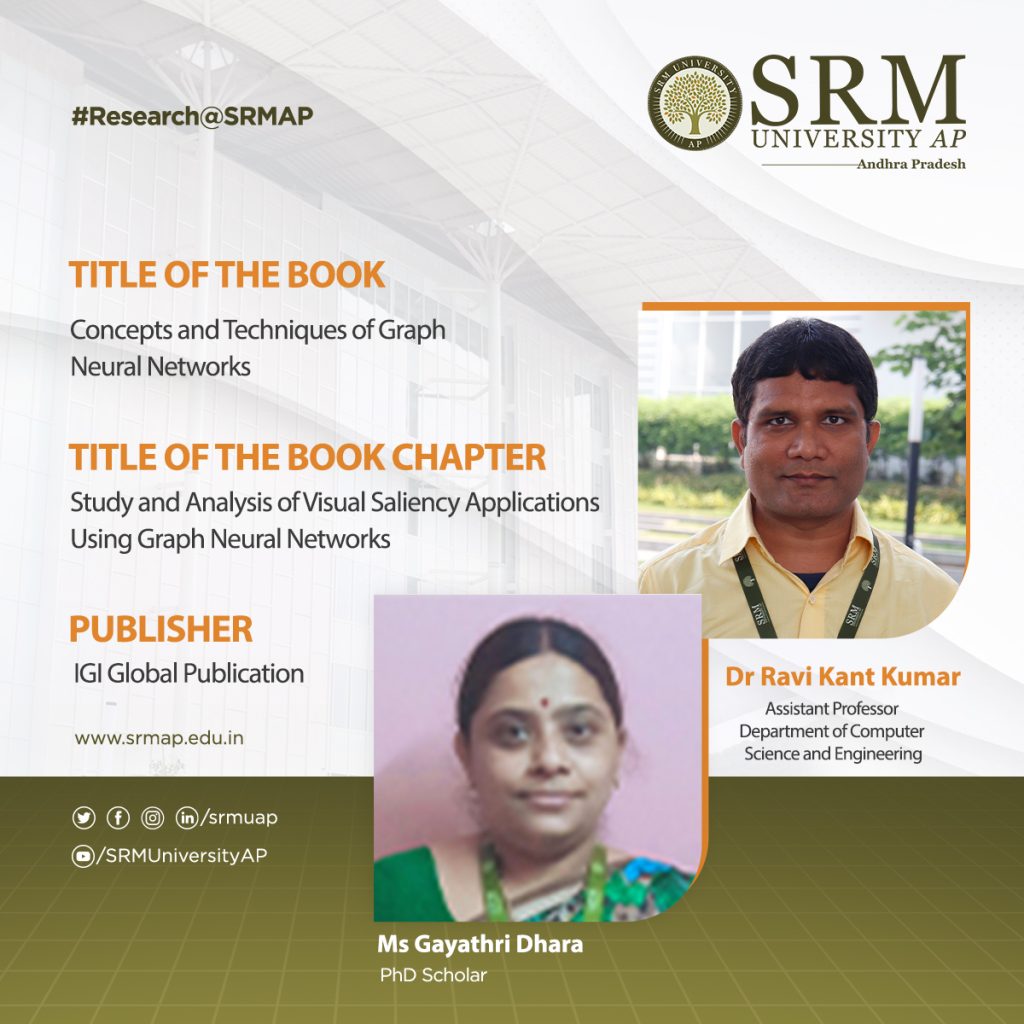
Dr Ravi Kant Kumar, Assistant Professor at the Department of Computer Science and Engineering at SRM University-AP and his research scholar, Ms Gayathri Dhara have recently made a significant contribution to the field of Graph Neural Networks. The teacher-student duo have offered relevant analysis of visual saliency applications using Graph Neural Networks (GNN) in their book chapter titled “Study and Analysis of Visual Saliency Applications Using Graph Neural Networks” in the book, Concepts and Techniques of Graph Neural Networks. The topic of their study will prove to be a key source of reference for industry professionals, researchers, scholars, academicians, practitioners, instructors, and students.
Description and Significance of the Chapter
The chapter covers the practical applications of GNN in the field of visual saliency. Various applications of computer vision problems implemented using graph neural networks (GNNs) have been studied and analysed in this chapter. It also includes the design approach of GNN, the various computational models used in GNN, its challenges and recommendations. The social significance of GNN in visual saliency extends to various domains like Human attention modelling, Advertising and marketing, Visual content understanding, and so on.
Significance of GNNs
Graph Neural Networks (GNNs) have gained significance in the field of visual saliency due to their ability to model complex relationships and dependencies within visual data. Visual saliency refers to the process of predicting the most visually prominent regions or areas in an image or video that attract human attention. It plays a crucial role in various computer vision applications, such as image understanding, object recognition, and scene understanding. GNNs can learn spatial dependencies and feature representations from visual data. There are many methodologies that address the detection of the salient object using GNN. GNNs can handle multi-modal data, combining visual information with other modalities such as textual or semantic features. This integration allows GNNs to leverage additional cues and contextual information to improve visual saliency prediction. So, studying these different salient object detection methods using GNN and knowing the challenges of GNN will help in meeting our research objectives.
- Published in CSE NEWS, Departmental News, News, Research News
Dr Aswini Presents a Poster on the International Stage
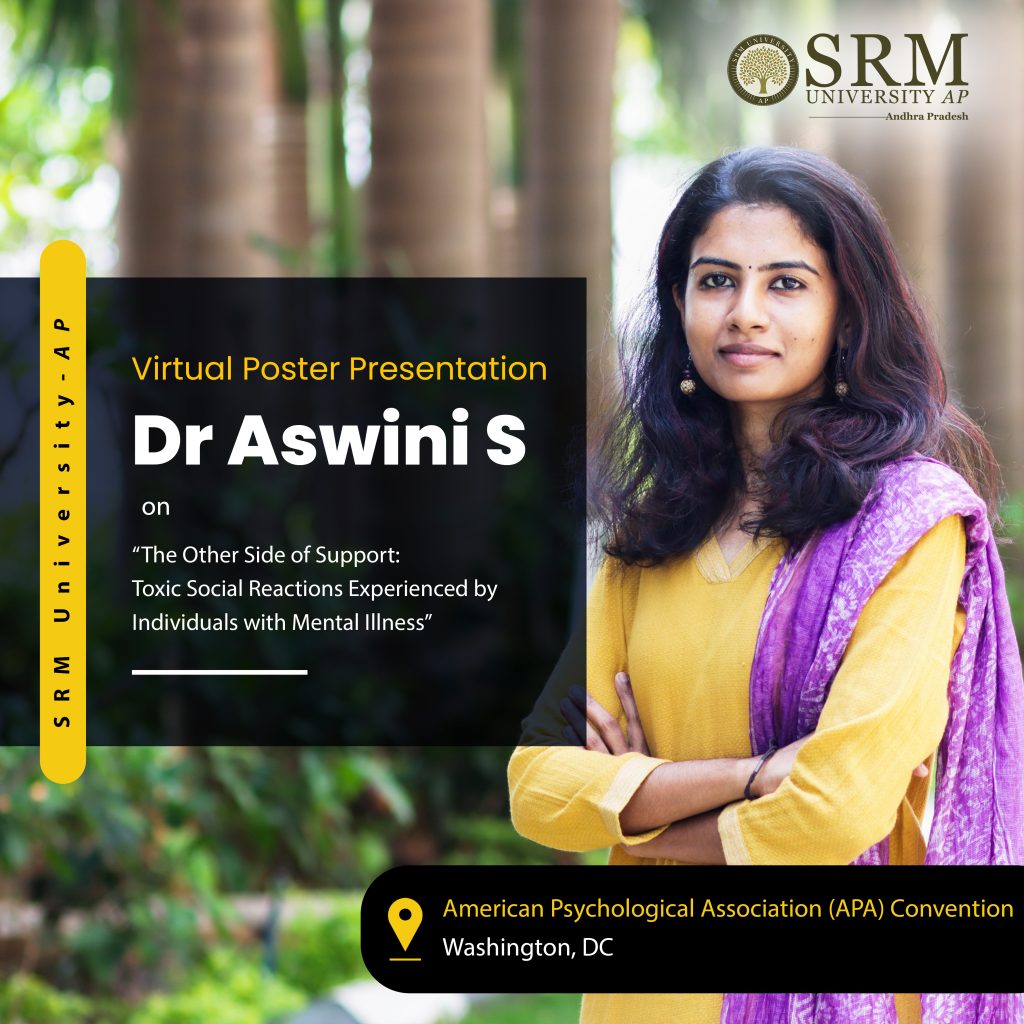 In a proud moment that highlights our institution’s commitment to excellence and innovation, we are thrilled to share the success of a recent poster presentation that graced the global stage.Dr Aswini S, Assistant Professor at the Department of Psychology at SRM University-AP recently represented the varsity at the American Psychological Association (APA) Convention in Washington, DC from August 3 – 5, 2023. The occasion was a prestigious Poster Presentation, titled, “The Other Side of Support: Toxic Social Reactions Experienced by Individuals with Mental Illness”
In a proud moment that highlights our institution’s commitment to excellence and innovation, we are thrilled to share the success of a recent poster presentation that graced the global stage.Dr Aswini S, Assistant Professor at the Department of Psychology at SRM University-AP recently represented the varsity at the American Psychological Association (APA) Convention in Washington, DC from August 3 – 5, 2023. The occasion was a prestigious Poster Presentation, titled, “The Other Side of Support: Toxic Social Reactions Experienced by Individuals with Mental Illness”
Abstract
Social support is undeniably an important aspect of everyday life, and it is particularly
important in the context of challenges. The role of social support as a protective factor is well established (Wright et al., 2013) in research, especially in the context of mental illness (Frame, 1981; Teo et al., 2020). While acknowledging the overwhelming evidence on the importance of social support, there is scant literature on the negative experiences of seeking and receiving support. The qualitative investigation revealed the toxic social reactions under the disguise of social support as reported by participants with mental illness (N=17). Participants experienced interactions which sometimes resembled social support but were either harmful or not beneficial to them. The frequently reported reactions of participants are trivialising of symptoms, toxic positivity, and fake sympathy. In comparison to physical illness, the indicators of mental illness are less objectively perceptible to others. Hence, the practice of dismissing symptoms and attributing disorders as momentary feelings, or imaginary experiences are found to be common. Moreover, the suggestion to be positive and reject anything that may trigger negative emotions along with the display of fake sympathy by people around is also found in participant narratives. This signifies the importance of studying social support through different dimensions rather than just focusing only on support that is helpful and beneficial. Future explorations can focus on understanding specific sources of support, kinds of support and the impact that such challenges have on the quality of relationships with significant others.
Keywords: Toxic positivity, mental illness, social support
The remarkable achievement underscores not only the quality of education we provide but also the dedication of our faculty in making impactful contributions to their fields.
- Published in Assistant Professor, News, Psychology, Psychology Faculty, Psychology News
Follow your Passion or Profession: Ms Ramya Proves Why Not Both!
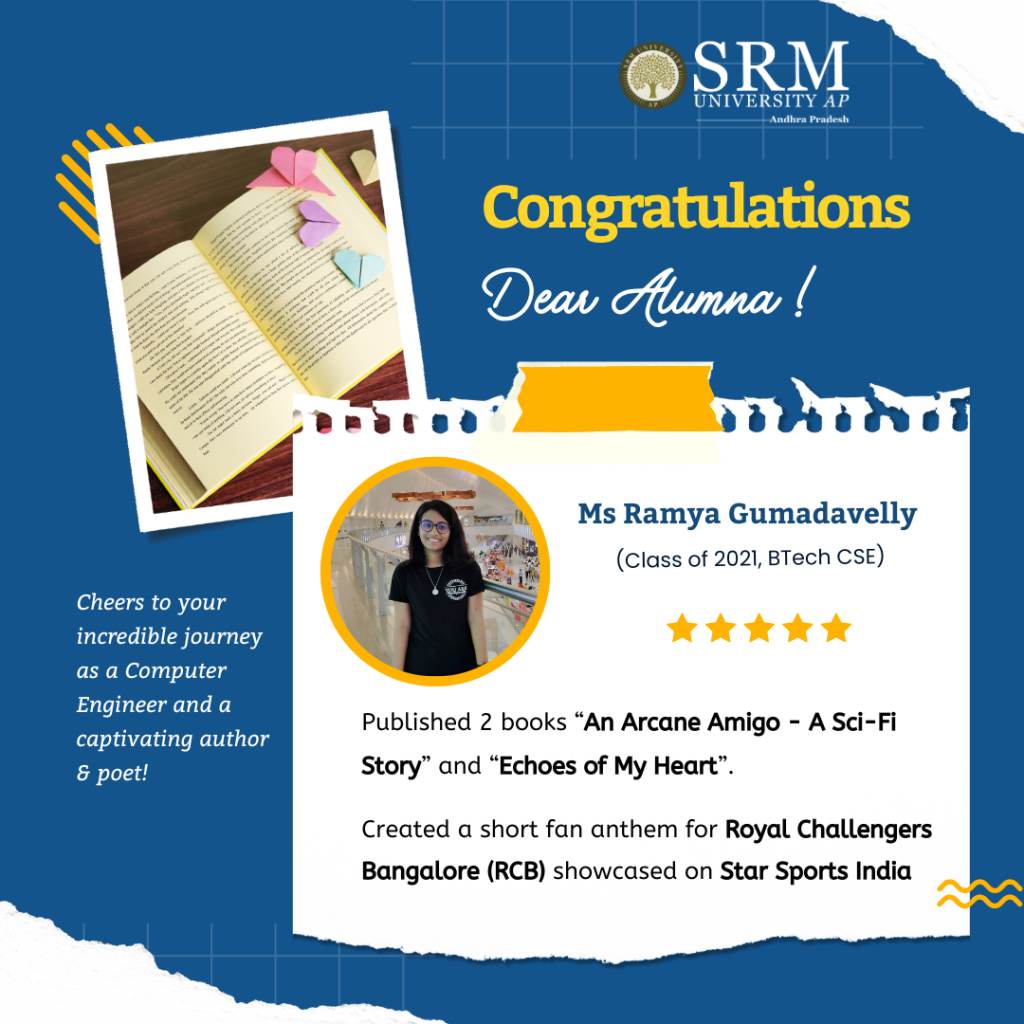
“Happiness lies in the joy of achievement and the thrill of creative effort” said Franklin D Roosevelt. The Directorate of Alumni Relations proudly announce that our dear alumna, Ms Ramya Gumadavelly (Class of 2021 BTech CSE) has manifested the saying with her remarkable achievement of publishing two captivating books “An Arcane Amigo – A Sci-Fi Story” and “Echoes of My Heart”. Her third book “Who in the World Am I?”, awaiting release, undoubtedly promises to be another milestone in her literary journey!
Her works, including a short fan anthem for Royal Challengers Bangalore (RCB) and several poems dedicated to her favourite cricketer Virat Kohli, have been showcased on Star Sports India for the last IPL season!
Congratulations to Ms Ramya for her remarkable achievement! Being a Computer Engineer by profession did not stop our talented alumna from pursuing her passion for literature and poetry!
Click to check out her published works:-
An Arcane Amigo – https://amzn.eu/d/d0nSO3F
Echoes of My Heart – https://amzn.eu/d/ds9UXVe
- Published in Alumni, Alumni Relations News, Departmental News, News
Biological Science Researcher bags DST INSPIRE Fellowship
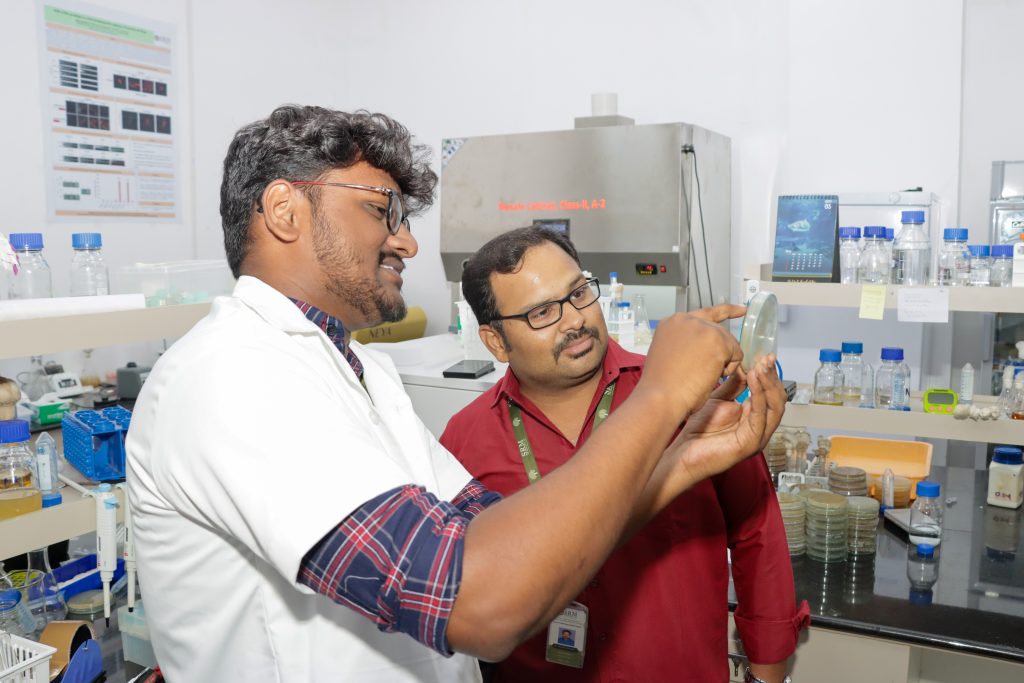
Barath Sivaraj, a research scholar from the Department of Biological Sciences at SRM University-AP has achieved an outstanding feat by receiving the DST INSPIRE Fellowship, a highly regarded programme sponsored and overseen by the Department of Science & Technology.
Sivaraj’s research focuses on exploring how bacteriophages, a type of virus that infects and reproduces inside bacteria, utilises the bacterial system. This research has earned Sivaraj the Fellowship, which runs for a duration of 5 years. The researcher also gets to carry out his research at any national or international laboratories other than their host institute for a period of 18 months.
Barath expresses his immense delight and pride in receiving this fellowship and considers it a significant milestone in his academic journey. Sivaraj explains that applicants must meet several criteria, such as being a top-ranked student in a full-time postgraduate science programme or a related field at the university level. Sivaraj credits his research supervisor, Dr Sutharsan Govindarajan, for guiding him through the application process. As a future prospect, Sivaraj plans to pursue his post-doctoral studies abroad and eventually wishes to offer his professional services at a reputable university.
We wish him all success!
- Published in Biology News, Departmental News, News, Research News
Assistant Professor Certified as Remote Pilot Instructor under DGCA
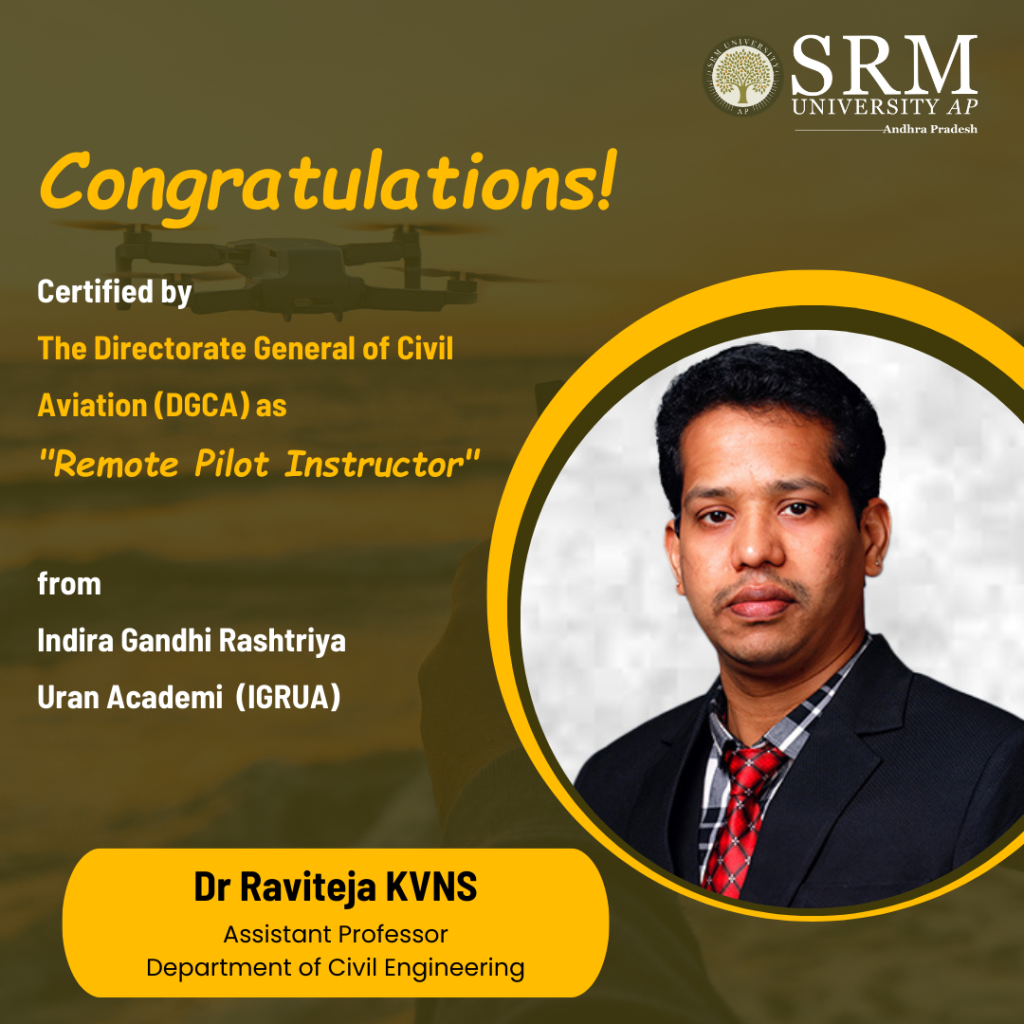
The world of technology is constantly evolving, and the aviation industry is no exception. From being operated exclusively by humans, aircraft systems have now advanced into Unmanned Aircraft Systems (UAS). To stay current in this ever-changing landscape, it’s crucial to update and upscale one’s skills.
Dr Raviteja KVNS, Assistant Professor at the Department of Civil Engineering, has successfully completed his rigorous training programme at the highly acclaimed Indira Gandhi Rashtriya Uran Akademi (IGRUA) and is now certified as Remote Pilot Instructor by The Director General of Civil Aviation (DGCA). With his newfound expertise on unmanned aerial vehicles, Dr KNVS is now poised to offer his invaluable guidance and support to aspiring drone pilots.
We extend our sincere congratulations to him on this outstanding achievement.
- Published in CIVIL NEWS, Faculty Achievements, News
Dr. Tewari receives Homi Bhabha National Institute’s Outstanding Doctoral Student Award
Dr. Somesh Vinayak Tewari, Assistant Professor, Department of Electrical and Electronics Engineering (SRM University AP) was awarded the prestigious “Outstanding Doctoral Students Award”, from Homi Bhabha National Institute (HBNI) at an event held at the Department of Atomic Energy (DAE) Convention Centre, Anushaktinagar, Mumbai. Dr. Tewari was presented this award for his PhD thesis titled “Study of surface flashover of insulator in gases at high pressure.”
- Published in Departmental News, EEE NEWS, News
AutoNxt Automation visits campus
Interactive session with industrial inventors
 World’s First Electric, Autonomous Tractor
World’s First Electric, Autonomous TractorKaustubh Dhonde, CEO, Swadeep Pillarisetti, Advisor and Board Director, Sachin Gowda, Embedded Engineer, and Aswanth Mulupuri, Intern, Department of Automation of AutoNxt Automation – an innovative Mumbai based startup, visited SRM University AP, Andhra Pradesh for a two-day program as a part of the National Science Day celebration at the campus. The company demonstrated their latest technological marvel, the World’s First Electric, Autonomous Tractor. “A lot of research is conducted globally with multiple companies working on the automation of on-road vehicles. However, off-road vehicles’ automation has hardly been touched upon previously, although there are less variables being controlled environments like farms, industrial plants, etc where it is more feasible a solution”, says Mr. Swadeep who has been advising the company which has brought about a revolutionary breakthrough in the domain of Indian agriculture.
Some of the exceptional features of the Electric Automated Tractor include fully electric drivetrain, low NVH (Noise, Vibration and Harshness) levels, mobile application for interaction with the tractor, live tracking, geo fencing capabilities, battery and system status reports on mobile app, obstacle detection technology and optional automatic hydraulic control of implements. The company is also planning to develop a common charging point that will use free energy sources.
 Students marveling at the automated tractor
Students marveling at the automated tractor
Demonstration by the CEO
AutoNxt Automation has created its niche by offering cost-effective and energy-efficient solutions to farming problems. Mr. Kaustubh believes “It is important that technology reaches out to the entire farmer class”. He further explains the crises of the Indian agricultural system that can be resolved using the Electric Automated Tractors, “The harvesting timeframe is narrow which increases the demand of skilled labour during this season, exponentially enhancing the cumulative cost of farming. The fully automated tractors embedded with camera identification systems and sensors reduce the operational expenses up to 4 times. Also, the IoT sensors give real-time feedbacks ensuring accuracy in tilling, ploughing, and spraying insecticide.”
The representatives of the company held a demonstrative session with the students and faculty on 26th February 2020, where they introduced the tractor and explained its technological viabilities. An interactive session was also held with the students on the same day. The session enabled the students to identify the practical applications of their acquired theoretical knowledge. The entrepreneurs inspired the students to create an impactful change that will eventually benefit society as a whole. Also, it creates an opportunity for them to be closely associated with people from the industry as well as the research domain. On the following day, a presentation was made to the faculty members of SRM AP to trigger discussions on technologies used by the Electric Automated Tractor. In the end, Mr. Kaustubh and Mr. Swadeep expressed their intent to involve students to work on real-time projects with the company, along with taking assistance from the faculty members to overcome hurdles pertaining to AI/ML technologies. Mr. Swadeep says, “The students will be exposed to real case studies, contribute to the improvement of the country, and in the process earn many accolades”.

Sachin Gowda interacting with the students
- Published in Mechanical Engineering NEWS, News


